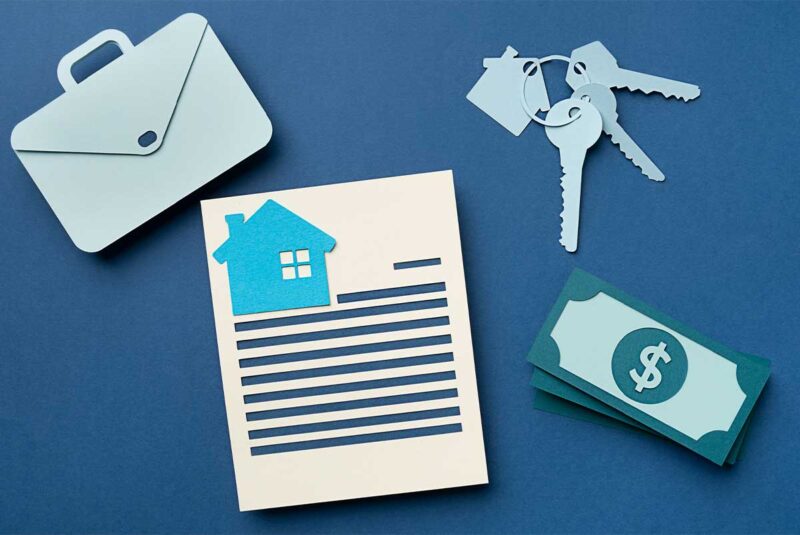Ready To Buy a Home?
Get Approved to Buy a Home
Rocket Mortgage® lets you get to house hunting sooner.
If you’re an aspiring homeowner, it’s a good idea to know your debt-to-income (DTI) ratio (aka your debt ratio or income ratio) because it can play a big role in determining whether you’ll qualify for a mortgage.
There’s a lot to learn about your DTI, but here’s a quick overview of the basics:
- You figure out your DTI by dividing your total monthly debt payments (think: rent, student loans, car note) by your gross monthly income (what you make before tax and payroll deductions) and multiply it by 100 to get the percentage.
- DTI is used by lenders to determine whether you qualify for a mortgage or other loan.
- The lower your DTI, the more likely you are to qualify for a loan at a favorable interest rate.
- Different types of loans require different DTIs, but as a rule of thumb, lenders typically require a DTI that’s lower than 40% (though sometimes you can qualify with a DTI of 50% or lower.)
With the overview out of the way, let’s move on to calculating DTI. We’ll also explore seven ways to lower debt and three strategies to increase income.
Calculating Your DTI
To calculate your DTI, you’ll need to know two things: your debt and your income.
Debt
Your debt includes all of your fixed monthly expenses, or put another way, all the bills you HAVE to pay, including:
- Rent and other housing expenses
- Homeownership expenses (including your mortgage payment, mortgage insurance, property taxes, homeowners insurance and homeowner association (HOA) fees)
- Student loan payment(s)
- Auto loan payment(s)
- Credit card minimums
- Personal loans
Lenders want to know more than how much monthly debt you have; they want to know how you handle your debt.
Income
Your gross monthly income is what you earn before taxes and payroll deductions. If you’re self-employed or don’t make a salary, come up with a monthly average based on 2 years’ worth of your income.
Once you’ve figured out your total monthly debt and your gross monthly income, divide your debt by your income.
Or, you can let our DTI calculator do the math for you!
Debt-to-Income Calculator
❓ Curious what your debt-to-income (DTI) ratio is? Enter your figures and let the magic begin!
What Is DTI?🟢 On Track – Hey money maestro! You’re right on track for your house-buying journey! Make sure you have all the information you need to make the right choice.
How much can I afford?🟢 On Track – You’re right on track for your house-buying journey!
How much can I afford?🚨 Above Recommended DTI – Some lenders have different requirements to qualify but it’s worth looking into your credit and finding out what you can afford within your budget.
What Is DTI?🚨 Too Much Debt – Seems like you’ve got a little too much debt to qualify with the income you’ve put in! Do you want to try again?
7 Ways To Lower Your Debt
There are lots of effective ways to lower your monthly and your overall debt. Consider these tried-and-tested strategies to get you started.
Stop adding on debt
We know, easier said than done, but we’ve got a strategy!
Step one: stop adding new debt to your old debt. Commit to creating a budget that breaks down your expenses to the dollar and compares those expenses to your income. Step two: Start looking for ways to spend less each month.
You can create your budget with an app or a sheet of paper and a pencil. Whatever method you choose, commit to bringing the numbers on the expenses side of the sheet (or screen) down. And step three: use that uncovered extra cash to pay down debt.
Go beyond minimum credit card payments
If you’ve got money to spare after making minimum payments on your credit cards, you may want to start thinking about paying your debts off more aggressively.
Be strategic about how you do this. You can use the debt snowball method or the debt avalanche method.
With the snowball method, you pay off your debts from the smallest amount to the largest one. With the avalanche method, you start by paying off your highest interest rate debt and continue until you arrive at your lowest interest rate debt.
Either way, focus on paying down one credit card as quickly as possible while paying the minimum balances on your remaining cards.
Once the first card is paid off, you use the money you save to pay off the next card. Over time, the amount you’ll accumulate to pay down your credit cards will grow, helping you to shrink your debt faster.
Consolidate and refinance high-interest debt
If you have high-interest debt, like credit cards, and have good credit, consider debt consolidation or refinancing with a low-interest personal loan. Your monthly payment may go up, but you’ll pay down your loan in a set period of time.
Take advantage of balance transfer offers
Many credit card companies will send card offers that feature a low or 0% interest rate. These offers are great, but those tantalizing, super-low interest rates usually only last for 6 – 18 months, and that’s only if you make your payments on time.
After the 6- or 18-month introductory period, the interest rate will be as much as current credit card interest rates or even higher. If you’re considering balance transfers to help you pay off your debt, keep in mind that you’ll also have to pay a balance transfer fee of 2% – 5% that gets added to your credit card balance.
These offers can help you save on interest while you’re working to pay down credit card debt. But time flies, so remember to keep an eye on the calendar!
Refinance your auto loan
If you’re paying off an auto loan, check to see if you can refinance your loan to get a better interest rate. You may be able to lower your monthly payment or pay off your loan in less time. Either way, you’ll save on interest and lower your debt-to-income (DTI) ratio.
Lower your student loan debt
In the first and second quarters of 2021, U.S. student loan debt was over $1.5 trillion (roughly 10% of the nation’s $15 trillion in total household debt). That’s almost double what it was 10 years ago.
If you’re dealing with student loan debt, you should know that it’s adding to your monthly DTI.[1]
Fortunately, there are ways to make your student loans “cheaper.” Some options include:
- Student loan refinancing
- Income-driven repayment plans
- Student loan forgiveness
- Student loan deferment or forbearance
Build an emergency fund
It may seem counterintuitive, but one of the best ways to lower your debt is to save money. With an emergency fund, you can pay for any unexpected expenses or emergencies with the money you’ve saved, not the high-interest credit cards in your wallet.
3 Ways To Increase Your Income
Now that you’ve tackled the debt side of the DTI equation, let’s tackle the income side and consider ways you might increase income.
Ask for a raise
This option may not be available for everyone for a variety of reasons, but if you’ve been at your job for a while, consider asking for a raise.
This isn’t the only way to increase your income, but it is a good place to start. You may need to balance the pros and cons of your own job situation and current skill set to determine the best move for you and your career.
Take on a side hustle
Have time to spare? Consider getting a side hustle to earn extra income. This can be anything from becoming a ride-share or delivery driver to turning a hobby or interest into a side business or providing consulting or coaching services.
Just make sure that your side hustle never puts your main hustle (aka your job and main source of income) at risk!
Ask your family for assistance
Depending on your situation, you may want to consider asking your parent(s) or other family members for a loan or a gift that you can use to pay down your debt.
The IRS allows family members to make tax-exempt gifts of up to $15,000 each year.[2] You can get a gift from each parent, and if you’re married, your partner can get a gift from each of your parents, too.
Just make sure that the money is a condition-free gift, not a loan.
If the money is a loan, make sure you have a written agreement detailing the terms of the loan, including the amount borrowed, any interest and any repayment schedule. You and the gift donor will need to show the IRS the agreement.
On the plus side, if you borrow from the Bank of Mom or Dad, it’s less likely that the loan will end up on your credit report and your parent(s) will hopefully be more forgiving if you’re late with a payment.
Lowering Your DTI
You can lower your DTI with the right combination of lowering your debt and increasing your income. Don’t be afraid to ask for help. If you’re looking for advice on how to manage your debt, talk to your local bank or credit union, a financial advisor or credit counselor.
Remember, the lower your DTI, the better your chances are of getting approved for a mortgage and other loans.
Get approved to buy a home.
Rocket Mortgage® lets you get to house hunting sooner.
The Short Version
- Your debt-to-income (DTI) ratio measures your monthly debt payments against your gross monthly income
- A DTI of 40% or lower makes it easier to qualify for a mortgage or other types of loans
- You can lower your DTI by lowering your debt or increasing your income
Federal Reserve Bank of New York. “Household Debt and Credit Report.” Retrieved September 2021 from https://www.newyorkfed.org/microeconomics/hhdc.html
Internal Revenue Service. “Frequently Asked Questions on Gift Taxes.” Retrieved September 2021 from https://www.irs.gov/businesses/small-businesses-self-employed/frequently-asked-questions-on-gift-taxes




